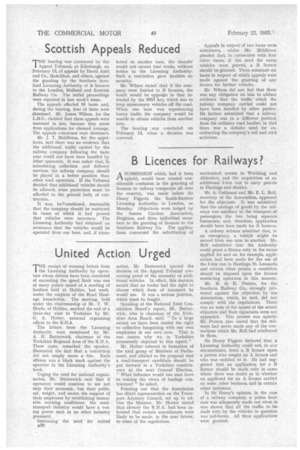Scottish Appeals Reduced
Page 44

If you've noticed an error in this article please click here to report it so we can fix it.
THE hearing was continued by the Appeal Tribunal, at Edinburgh, on February 13, of appeals by David Auld and Co., Mauchline, and others, against the granting by the Southern Scotland Licensing Authority of A licences to the London, Midland and Scottish Railway Co. The initial proceedings were reported in last week's issue.
The appeals affected 16 bass and, during the hearing, four of them were dismissed. Mr. James Wilson, for the L.M.S., claimed that these appeals were unsound in law, because they arose from applications for claimed tonnage. The appeals concerned were dismissed.
Mr. J. T. Middleton, for the appellants, said there was no evidence that the additional traffic carried by the railway company following the basic year could not have been handled by other operators. It was unfair that, in introducing collection and delivery services, the railway company should be placed in a better position than other road operators. If the Tribunal decided that additional vehicles should be allowed, some protection must be afforded to the general body of contractors.
It .was, he Y'continucd, reasonable that the company should be restricted to bases at which it had proved that vehicles were necessary. The Licensing Authority had obtained an assurance that the vehicles would be operated from one base, and, if trans
ferred to another base, the transfer would not exceed four weeks, without notice to the Licensing Authority. Such a restriction gave hauliers no security.
Mr. Wilson stated that if the company were limited to B licences', the result would be opposite to that intended by the 1933 Act, which was to keep unnecessary vehicles off the road. When one base was experiencing heavy traffic the company would be unable to obtain vehicles from another area.
The hearing was concluded on February 14, when a decision was reserved. • Appeals in respect of two bases were withdrawn, whilst Mn Middleton pleaded that, in connection with four other bases, if the need for extra vehicles were proved, a •B licence should be granted. There remained six bases in respect of which appeals were made against the granting of any licence for further vehicles.
Mr. Wilson did not feel that there was any obligation on him to adduce evidence that the traffic ' which the railway company carried could not have been handled by other parties. He further submitted that a railway company was in a different position from the ordinary road haulier, in that there was a definite need for coordinating the company's rail and road activities.




































































































